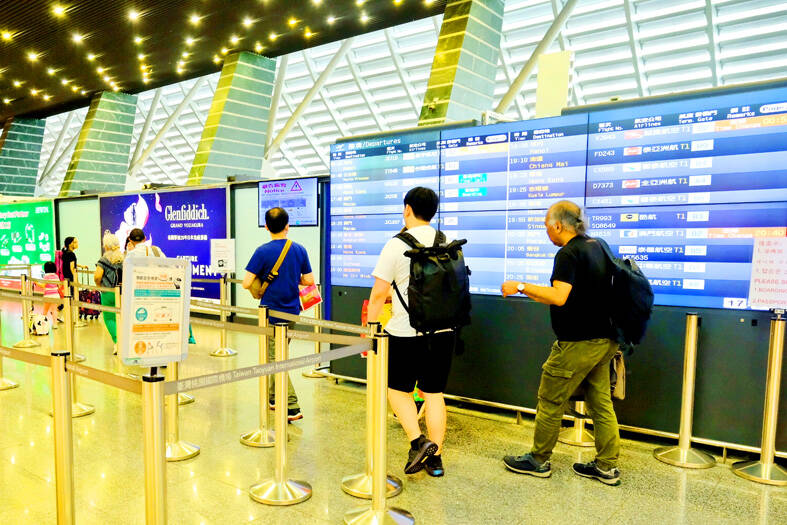Taoyuan International Airport Corp (TIAC) yesterday announced that, starting in the fall, it would expand its “one-stop security” policy by waiving carry-on baggage checks for transit passengers arriving from the US.
Since 2019, transit passengers arriving from the US have been exempt from having their checked luggage examined by airport security personnel at Taiwan Taoyuan International Airport, the airport operator said.
The one-stop security policy is implemented in accordance with Annex 17 to the Convention on International Civil Aviation and International Civil Aviation Organization Aviation Safety Manual, the company said.

Photo: CNA
It stipulates that if departure airports have been proven, through document reviews and on-site inspections, to adopt stricter or comparable aviation security measures than those adopted by connecting airports, passengers arriving from departure airports would be waived from security rescreening of bodies, carry-on baggage and checked luggage, the company said.
In 2019, travelers from the US were the largest source of transit passengers in Taiwan at 25 percent, the company said, adding that the ratio has climbed to nearly 30 percent this year.
Most transit passengers are headed to Vietnam, Indonesia or the Philippines, while those transferring to Singapore, Malaysia, Thailand and other Southeast Asian cities have also gradually increased, it said.
The expanded implementation of the one-stop security policy would optimize traffic flow of transit passengers at Taiwan Taoyuan International Airport, spare transit passengers the hassle of repeat screenings and give them more time to stay in the airport’s commercial areas, the company said.
It would also reduce the need for more personnel from the Aviation Police Bureau, it added.
“To implement the policy, we have made some preparations in advance, including installing new access control facilities and coordinating with airlines and the Aviation Police Bureau to separate passengers,” the company said.

AGING: As of last month, people aged 65 or older accounted for 20.06 percent of the total population and the number of couples who got married fell by 18,685 from 2024 Taiwan has surpassed South Korea as the country least willing to have children, with an annual crude birthrate of 4.62 per 1,000 people, Ministry of the Interior data showed yesterday. The nation was previously ranked the second-lowest country in terms of total fertility rate, or the average number of children a woman has in her lifetime. However, South Korea’s fertility rate began to recover from 2023, with total fertility rate rising from 0.72 and estimated to reach 0.82 to 0.85 by last year, and the crude birthrate projected at 6.7 per 1,000 people. Japan’s crude birthrate was projected to fall below six,

US President Donald Trump in an interview with the New York Times published on Thursday said that “it’s up to” Chinese President Xi Jinping (習近平) what China does on Taiwan, but that he would be “very unhappy” with a change in the “status quo.” “He [Xi] considers it to be a part of China, and that’s up to him what he’s going to be doing, but I’ve expressed to him that I would be very unhappy if he did that, and I don’t think he’ll do that. I hope he doesn’t do that,” Trump said. Trump made the comments in the context

SELF-DEFENSE: Tokyo has accelerated its spending goal and its defense minister said the nation needs to discuss whether it should develop nuclear-powered submarines China is ramping up objections to what it sees as Japan’s desire to acquire nuclear weapons, despite Tokyo’s longstanding renunciation of such arms, deepening another fissure in the two neighbors’ increasingly tense ties. In what appears to be a concerted effort, China’s foreign and defense ministries issued statements on Thursday condemning alleged remilitarism efforts by Tokyo. The remarks came as two of the country’s top think tanks jointly issued a 29-page report framing actions by “right-wing forces” in Japan as posing a “serious threat” to world peace. While that report did not define “right-wing forces,” the Chinese Ministry of Foreign Affairs was

PREPAREDNESS: Given the difficulty of importing ammunition during wartime, the Ministry of National Defense said it would prioritize ‘coproduction’ partnerships A newly formed unit of the Marine Corps tasked with land-based security operations has recently replaced its aging, domestically produced rifles with more advanced, US-made M4A1 rifles, a source said yesterday. The unnamed source familiar with the matter said the First Security Battalion of the Marine Corps’ Air Defense and Base Guard Group has replaced its older T65K2 rifles, which have been in service since the late 1980s, with the newly received M4A1s. The source did not say exactly when the upgrade took place or how many M4A1s were issued to the battalion. The confirmation came after Chinese-language media reported